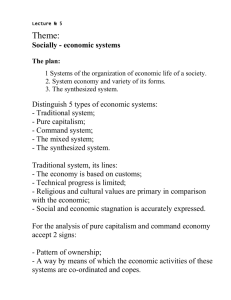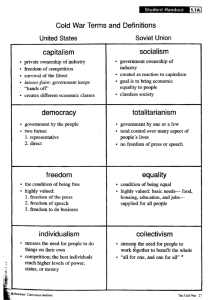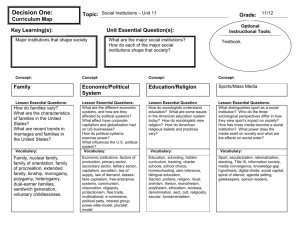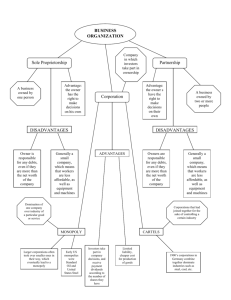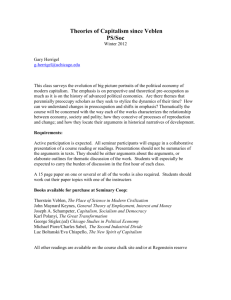The Virtues of Free Enterprise
advertisement
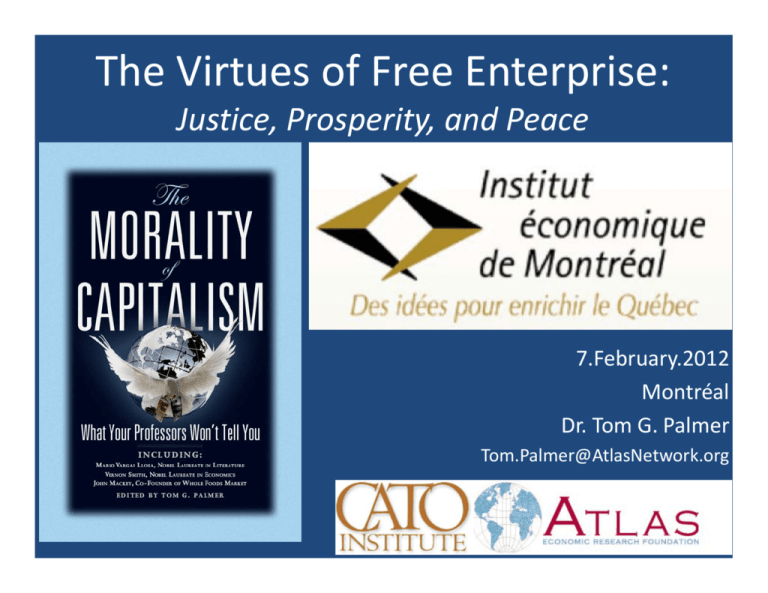
The Virtues of Free Enterprise: Justice, Prosperity, and Peace 7.February.2012 Montréal Dr. Tom G. Palmer Tom.Palmer@AtlasNetwork.org A Note About Terms • Free Enterprise • Free Markets • “Capitalism” So… What Is “Free Enterprise” (or “Capitalism”?) • “…that subspecies of all the systems characterized by private property, which carries out new combinations of factors of production and involving the creation of credit…” Joseph Schumpeter, “Can Capitalism Survive?” • “…a system in which private individuals take initiatives with their own capital to – usually to enhance production, but to produce something that they can sell on the market for a profit…” Joyce Appleby, interviewed on her new book The Relentless Revolution: A History of Capitalism • ". . . private property and free labor without central planning, regulated by the rule of law and by ethical consensus;” “the age of innovation,” Deirdre McCloskey, Bourgeois Dignity • It is an economic system… • …a legal system… • …a cultural/social system…of relentless innovation resting on equality of well defined and legally secure rights (including “careers open to talent”) and on decentralized innovation and processes of trial and error through the voluntary processes of market exchange Modern free‐markets are characterized by what the economist Joseph Schumpeter called “creative destruction.” • “the problem that is usually being visualized is how capitalism administers existing structures, whereas the relevant problem is how it creates and destroys them.” – Joseph Schumpeter, Capitalism, Socialism, and Democracy But Free Enterprise Is More than merely Well Defined, Legally Secure, and Transferable Property • It also entails a Culture of –Entrepreneurship –Innovation (“Openness to the Future”) –Service & Adding Value Moral Foundations of Free Enterprise • Based on – Property in One’s Person – Property in One’s Freedom (including Freedom of Contract) – Property in One’s Estate, characterized by the “Three D’s” – Definable – Defendable – Divestible – Rule of Law But first…… • Is Free Enterprise/Capitalism on Trial? Is it Responsible for the Financial Crisis? Capitalism on Trial: Is It Responsible for the Present Crisis? Are these the Institutions of “Capitalism”? Free Enterprise vs. Cronyism (or “Crony Capitalism”) • Many complaints about “capitalism” are not about free enterprise, but about cronyism and privilege • Cronyism is a feature of interventionism, of the exercise of state power to secure special privileges for some at the expense of others, to block competition, to confiscate wealth, and to secure the interests of those with access to political power Discourse about Capitalism has been Poisoned : Some Common (Mis)conceptions about Free Enterprise • Competition – Opposite of Cooperative: “Dog Eat Dog,” “Cutthroat” – OR: Competition in order to Cooperate • Exchange – “Selfish,” “Greedy” – OR: Mutually Beneficial • Profit – “Obscene,” “Windfall” – OR: Measures of value added So…what has free enterprise achieved? • Let’s start by looking at how much the world has changed in recent years • Then let’s measure the degree of economic freedom in the world today and see what we find Let’s start at the beginning: The Natural Condition of Humanity is Poverty www.freetheworld.com Say’s Law of Markets: Free Enterprise Morality, Friendship, and Peace • “Each individual is interested in the general prosperity of all, and the success of one branch of industry promotes that of all the others….The position of a nation, in respect of its neighbors, is analogous to the relation of one of its provinces to the others, or of the country to the town; it has an interest in their prosperity, being sure to profit by their opulence.” –Jean‐Baptiste Say Freedom of Trade Creates Interests for Peace….. “The international interconnection of the interests resulting from freedom of trade is the most effective means for the prevention of war. Had we advanced so far as to see a good customer in every foreigner, there would be much less inclination to shoot at him….” John Prince Smith, member of the German Reichstag 1860 The Capitalist Trading Peace • As Erik Gartzke has shown, the well studied “democratic peace” is really the “capitalist peace.” Nations that trade are less likely to go to war. – Erik Gartzke – American Journal of Political Science, Vol. 51, No. 1, January 2007, Pp. 166–191 Evidence: Economic Freedom and Peace Evidence: Democracy and Peace Democracy is favorable for peace, but it is even more favorable to peace when democracies embrace free trade Commerce Civilizes Us “For the Cyclops have no ships with crimson prows No shipwrights there to build them good strong craft That could sail them out to foreign ports of call As most men risk the seas to trade with other men.” -- Homer, The Odyssey




